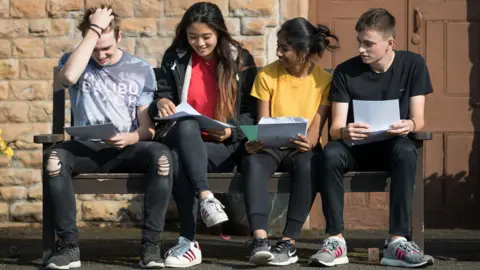Teachers to grade students for cancelled exams
 PA
PATeachers in England will be asked to assess the grades they think pupils would have achieved in cancelled GCSE and A-level exams.
This will be used by exam boards to decide results - along with a ranking by ability of pupils in each subject in a school, also judged by teachers.
This approach from the qualifications watchdog Ofqual will replace exams disrupted by the coronavirus outbreak.
Results days will be no later than originally planned and may be earlier.
"Our overriding aim in this is to be fair to students this summer and to make sure you are not disadvantaged," said Sally Collier, Ofqual's chief executive.
Paul Whiteman, leader of the National Association of Head Teachers, said there was no "perfect solution".
But he said the substitute plan was "pragmatic and the fairest approach to take in these exceptional circumstances".
Sir Peter Lampl, founder of the Sutton Trust social mobility charity, warned that "teacher assessments can unconsciously disadvantage those from low-income backgrounds".
- In Scotland, grades will be estimated by teachers and the Scottish Qualifications Authority says that coursework which has already been submitted by pupils will not count towards results
- In Wales, teachers will estimate grades, but there will not be an extra exam in the autumn.
- In Northern Ireland, details are expected to be published later with plans for cancelled exams
Teachers' predictions for A-levels, AS-levels and GCSEs in England will be based on the evidence available - such as previous exam results, tests, homework, coursework, mock exams and what the regulator calls "general progress during your course".
Teachers will be asked to say what they think would have been the grades most likely to have been achieved if the summer exams had taken place - based on an overall professional judgement.
But they will also be asked to put students in order of expected achievement within each predicted grade band.
This will be used to moderate the overall share of grades in schools across the country.
This could mean adjusting the grades suggested by teachers if they seem too generous or harsh, or unlikely in the context of previous results at a school - and to make the overall distribution of grades consistent with other years.
Schools will not be allowed to tell students the grades submitted to exam boards or how they are ranked.
If pupils think they could improve on the grades given to them, there are proposals for an alternative exam in the autumn.
This could be too late for A-level students intending to go to university this year - although it remains uncertain whether campuses will be able to re-open for the autumn term.
Mary Bousted, joint leader of the National Education Union, welcomed the news that "grades won't be based on mock exam results, or any other single piece of evidence alone".
But she said teachers could be "uncomfortable" with putting students into rank order.
The results will be available to students no later than the planned dates in August - but Ofqual suggested that they may be available sooner.
A process for appeals has still to be decided.
It also remains uncertain how grades will be decided for pupils who are home-taught and do not have links with schools that could send in predicted grades.
Alternative plans for vocational qualifications will be announced at a later date.
In Wales, teachers will predict grades and rank students - but the option of an extra exam in the autumn will not be available.
Philip Baker, chief executive of Qualifications Wales, said: "We want centres to consider each learner's performance over the course of study and make a realistic judgement of the grade and rank of each learner."
England's Education Secretary, Gavin Williamson, said cancelling exams had been a "necessary step to help fight the spread of coronavirus".
But he said Ofqual's plans would provide "assurance to students, parents and schools that grades awarded this summer will accurately reflect students' abilities and will be as valid this year as any other".
